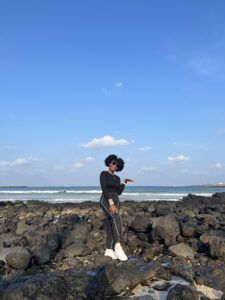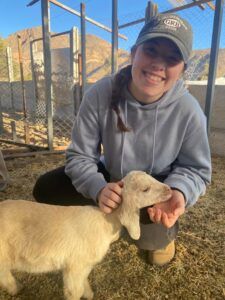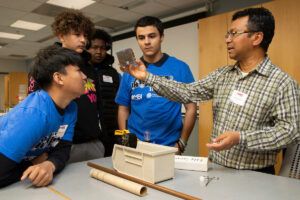Go See the World
As students begin to travel again for study abroad, they are appreciating the life-changing experiences it can offer.
By Rebecca Cross

Gabby DeAngelis at the Acropolis in Athens, Greece. A UNESCO World Heritage site, the Acropolis is the most striking and complete ancient Greek monumental complex still existing in our times. Photo courtesy of Gabby DeAngelis.
Seven weeks into Gabby DeAngelis’s spring 2020 semester abroad in the Czech Republic, the COVID-19 pandemic reached Eastern Europe. Within just a few days, a curfew was in place, restaurants shuttered, shops shut down. Her study abroad provider, American Institute for Foreign Study (AIFS), started closing down programs: China first, then Italy. Just days later, they shut down the Czech program. “We thought we would make it a little longer,” DeAngelis said, “but it spread so quickly.”
One by one, her classmates left the country. At that point, DeAngelis just wanted to get on a plane and get home, but she had arranged her own travel to the Czech Republic rather than going through AIFS, so she had to find a flight on her own. It was an exercise in real-world crisis skills that has stayed with her to this day, and given her the confidence to travel anywhere. It took three days of constant checking for flights and phone calls with her mother back in Massachusetts. Flights back to Boston were hard to get because Logan Airport was closing terminals. She had to go five hours the wrong way to Moscow, then go back 12 hours to New York.
The Prague airport was desolate. The only people on her flight were Russian nationals wondering what she was doing there. “They were like, ‘You’re going the wrong way!’” DeAngelis remembered, laughing.
The 2022 Worcester State graduate can laugh about it now, but at the time, it was incredibly stressful. She had always wanted to go abroad—it was a must for her college decision—and she started working in the international programs office her first year at Worcester State University and worked there all four years. “Being sent home from COVID, I was like, ‘This is so terrible,’” she said. “But now I’m not scared to face any travel challenges. I know I’m an awesome problem solver because I made it through.”
Travel shut down
Back in the States, study abroad providers and international offices at universities were scrambling to deal with closing programs and stranded students. “The pandemic took us all by surprise,” said Katey Palumbo, director of Worcester State’s International Office. “The world had never shut down before.” Worcester State immediately canceled their four short-term, faculty-led programs, which 150 students had planned on attending.
For more than a week, parents were constantly calling Palumbo on her cell phone. There was a lot of uncertainty, she said, a lot of tears. One mother, who was in remission from cancer, wanted her daughter to be moved to a hotel. Another wanted Palumbo to tell her daughter in Greece not to go traveling, thinking Palumbo would have more sway with her. “Panic was creeping into the conversations,” Palumbo said.
Throughout that harrowing week, Palumbo constantly reached out to parents and students to reassure them and help with logistics, and eventually, Worcester State students were home. Then came the challenge of figuring out how to ensure academic continuity. In most cases, that meant online classes. DeAngelis’s cohort finished all their classes virtually, which was a challenge with all of the different time zones—professors were in Prague, and students were on east and west coasts. But all the Worcester State students successfully completed their programs and got their academic credit.
Through the ordeal, Palumbo and other study abroad professionals at other institutions pulled together. “I’ve gotten to know colleagues so much better because we were all a support network for each other, trying to navigate something that no one had experience with,” Palumbo said. “It’s left us better prepared and better connected, which was a positive impact I would not have anticipated.”
Slow, steady rebound
The pandemic profoundly affected study abroad. Prior to the pandemic the number of US students studying abroad had steadily increased from 154,168 in 2000-01 to 347,099 in 2018-19, according to Open Doors. The pandemic affected the second half of the 2019-20 academic year, bringing the total number of students going abroad down to 162,633, with an even steeper decline the following year to a mere 14,549—a 91 percent decline. Only recently have numbers started to creep back up. For the 2022-23 academic year, 83 percent of institutions reported an increase in students studying abroad, though exact numbers have yet to be released.
Palumbo hopes the numbers of US students going abroad will not only rebound to pre-pandemic levels but surpass them. “As we see our world increasingly become more global, our US students are at a disadvantage if they don’t travel abroad because they don’t have the opportunity to develop those cross-cultural skills that they can then utilize in the workplace,” she said.
Study abroad has numerous benefits. It’s been shown to improve retention, GPA, and student graduation rates. It also exposes students to different perspectives and different news analyses—including of developments in the US. Many students returning from a semester abroad have remarked to Palumbo that they realized that they were more ignorant of the US and its politics than their peers from a different country.
To make study abroad more accessible, Worcester State helps to support opportunities for travel. All of the 35 Worcester State students who went abroad on short-term, faculty-led programs during the 2023 spring break received $500 scholarships, either through the Lt. Col. James F. Sheehan ’55 Study Abroad Fund or the Corcoran Family Foundation Scholarship. In April, the university received an IIE American Passport Project Grant that will allow it to support 25 first-year, Pell Grant eligible, diverse students to get their first time passport. “We do our very best to ensure that all of our students can have this opportunity should they want it, and it doesn’t have to be cost prohibitive,” Palumbo said.
Studying in South Korea and Chile

Janet Amoako on Jeju Island, the second largest island in South Korea and home to a World Heritage site, the Jeju Volcanic Island and Lava Tubes. Photo courtesy of Janet Amoako.
Senior Janet Amoako was one of the students who went abroad after programs opened back up. In fall 2022, she went to South Korea during her junior year on a CIS Abroad program, where she was able to take classes that went toward her double major in business and psychology. Amoako had never been abroad before. “I was a little nervous beforehand,” she said, “but people were really nice. I never had a bad interaction.”
Seoul was beautiful, she said, though at times she found the number of people in the city overwhelming. She appreciated the accessibility and reliability of public transportation and loved the food, which she found much cheaper and more convenient than back home.
A commuter student at Worcester State, she lived on campus at a Korean university and got to experience campus life and made a lot of Korean and international friends. Koreans were very welcoming when it came to sharing their culture, she said. Her friends took her to visit landmarks and encouraged her to try on a hanbok, a traditional Korean dress. She still talks often to the friends she made there and plans on going back to Korea on vacation to see the people she met there.
“After I came back I was more confident,” Amoako said. “I survived on my own for four months. I know now there isn’t anywhere I won’t be able to fit in.”

Rhea Harrigan on Elsa Flores’s farm in Putre, Chile, a very small indigenous town in the north of the country. Photo courtesy of Rhea Harrigan
For Rhea Harrigan, the pandemic actually made her study abroad dreams possible. The senior had started as a nursing major but switched to public health following the pandemic. The new major allowed her the freedom to take courses on a study abroad program.
Since she was also doing a minor in Spanish for health professionals, she chose to go to Chile on an SIT Study Abroad program focused on traditional medicine and public health. It was the most expensive program, she said, but scholarships made it affordable.
Unlike Amoako, who took classes at a university and lived on campus, Harrigan took classes with a cohort of 11 other students and lived with host families. Her group, in fall 2022, was the first group to do the program in person since the start of the pandemic.
Harrigan found the close-knit nature of the program the perfect fit. She became very close to her classmates and host families. She also appreciated having four weeks at the end of the semester to complete an independent project. “I grew a lot as a person, but also as a student,” she said.
“Everyone said when you study abroad it will change your life, so I knew it was going to,” she said. “And it did!”
Life-changing experiences
Whether students head off to destinations rural or urban, live on a college campus or with a family, feelings of self-assurance and wonder are typical. “Study abroad does inform the development of the whole person, and you really can’t understand what that means until you see them come back, and you see them more mature and having more confidence in themselves. It’s a wonderful thing to see. And it informs them for life,” Palumbo said.
Palumbo knows this firsthand, as a former study abroad participant herself. She was one of those students for whom study abroad wasn’t part of her plans. “I was never raised with the expectation that I would go out and see the world,” she said, “but one day I was walking through campus, as luck would have it, and there was information on a study abroad program.” She spent a summer in Edinburgh studying Scottish history and literature, and that experience largely influenced the trajectory of her life.
The same is true for DeAngelis, who now works at Simmons University’s Center for Global Education. Despite her experience in 2020, she wasn’t deterred from studying abroad and was determined to go abroad again. So, in spring 2022, she closed out her college career in Barcelona.
“It’s so eye-opening to experience different cultures,” she said, “and it can benefit your career development. I really like what I do. It’s an awesome community of people who are interested in the same things I’m interested in, and it’s exciting to be able to steer students in that direction and help them find that as well.”
She tells students who are considering study abroad but are nervous, “You’re not going by yourself. There’s a whole community of people to help you through the process.”
Palumbo believes that Worcester State is in a good place to expand its own short-term, faculty-led programs—the most popular type of study abroad experience for students. In February 2020, the university received a State Department IDEAS Grant for faculty to travel to research locations for future program development. When things started shutting down a month later, they had to put that travel on hold, but, by June of this year, eight faculty have gone on site visits. In addition, the operation of the International Office is more efficient than ever. “The pandemic was the perfect time to look at our current process and dismantle it and restructure it,” Palumbo said. The time to study abroad is better than ever.
Top image: The Haedong Yonggungsa Temple in Busan, South Korea. The temple was first built in 1376 by the Buddhist teacher known as Naong. Photo by Janet Amoako.



